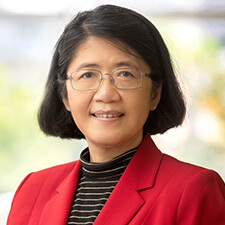Chairs

Metin Akay, PhD
University of Houston
Metin Akay received his B.S. and M.S. in Electrical Engineering from the Bogazici University, Istanbul, Turkey in 1981 and 1984, respectively, and a Ph.D. degree from Rutgers University in 1990. He also received an honorary Ph.D. from the Aalborg University in 2015. He is currently the founding chair of the new Biomedical Engineering Department and the John S. Dunn professor of biomedical engineering at the University of Houston. He is currently the President of IEEE Engineering in Medicine and Biology Society.
He has played a key role in promoting biomedical education in the world by writing and editing several books, editing several special issues of prestigious journals, including the Proc of IEEE, and giving several keynotes and plenary talks at international conferences, symposiums, and workshops regarding emerging technologies in biomedical engineering. He is the founding editor-in-chief of the Biomedical Engineering Book Series published by the Wiley and IEEE Press and the Wiley Encyclopedia of Biomedical Engineering. He is also the editor of the Neural Engineering Handbook published by Wiley/IEEE Press and the first steering committee chair of the IEEE Trans on Computational Biology and Bioinformatics.
He established the IEEE EMBS Special Topic Conference on Neural Engineering. He is also the chair of the IEEE EMBS Neuroengineering Technical Committee. He was the program chair of the International IEEE EMBS 2001 and the co-chair of the International IEEE EMBS 2006 and the program co-chair of the International IEEE EMBS 2011 and the IEEE EMBS Point-of-Care Health Technologies (POCHT) 2013. He currently serves on the advisory board of several international journals including the IEEE T-BME, IEEE T-ITIB, Smart Engineering Systems, etc. and furthermore serves on several NIH and NSF review panels Dr. Akay is a recipient of the IEEE EMBS Early Career and Service awards as well an IEEE Third Millenium Medal and is a fellow of IEEE, the Institute of Physics (IOP), the American Institute of Medical Biological Engineering( AIMBE), and the American Association for the Advancement of Science (AAAS). His Neural Engineering and Informatics Lab is interested in developing a novel Brain Chip for precision medicine and an intelligent wearable system for monitoring and detecting coronary artery disease. In addition, his lab is currently investigating the effect of maternal alcohol and nicotine intake on the health risk in newborns.

Chwee Teck (C.T.) Lim, PhD
National University of Singapore
Professor Chwee Teck Lim is is the NUSS Chair Professor at the Department of Biomedical Engineering and Director of the Institute for Health Innovation and Technology at the National University of Singapore. He conducts research in human diseases and develops medical sensing and wearable technologies for disease diagnosis and therapy. He has over 450 scientific publications, delivered over 420 plenary/lkeynote/invited talks and ha over 60 filed and granted patents. He also cofounded six startups. He and his team has garnered over 100 research awards and honours including elected fellowships in the US National Academy of Inventors, IUPESM, IAMBE, AIMBE, ASEAN Academy of Engineering and Technology, Academy of Engineering, Singapore and Singapore National Academy of Science.

Paul Sajda, PhD
Columbia University
Paul Sajda is a Professor of Biomedical Engineering, Electrical Engineering and Radiology (Physics) at Columbia University. He is also a Member of Columbia’s Data Science Institute and an Affiliate of the Zuckerman Institute of Mind, Brain and Behavior. He received a BS in electrical engineering from MIT in 1989 and an MSE and PhD in bioengineering from the University of Pennsylvania, in 1992 and 1994, respectively. Professor Sajda is interested in what happens in our brains when we make a rapid decision and, conversely, what processes and representations in our brains drive our underlying preferences and choices, particularly when we are under time pressure. His work in understanding the basic principles of rapid decision-making in the human brain relies on measuring human subject behavior simultaneously with cognitive and physiological state. Important in his approach is his use of machine learning and data analytics to fuse these measurements for predicting behavior and infer brain responses to stimuli. Professor Sajda applies the basic principles he uncovers to construct real-time brain-computer interfaces that are aimed at improving interactions between humans and machines. He is also applying his methodology to understand how deficits in rapid decision-making may underlie and be diagnostic of many types of psychiatric diseases and mental illnesses. Professor Sajda is a co-founder of several neurotechnology companies and works closely with a range of scientists and engineers, including neuroscientists, psychologists, computer scientists, and clinicians. He is a fellow of the IEEE, AMBIE and AAAS and Chair of the IEEE Brain Initiative. He is also a recent recipient of the DoD’s Vannevar Bush Faculty Fellowship (VBFF).
Program Chairs

Natalie Mrachacz-Kersting
Albert-Ludwigs University Freiburg
Professor Natalie Mrachacz-Kersting received her PhD in Biomedical Science and Engineering from The University of Aalborg, Denmark in 2005 and held several post-doctoral positions at the University of Auckland, New Zealand and Aalborg University, Denmark. From 2007 she was Associate Professor at the Center for Sensory-Motor Interaction, Aalborg University, and in 2019 Professor in Neuroscience and Medical Technologies at the University of Applied Sciences and Arts Dortmund, Germany. In June 2021 she accepted a position as full Professor in Neuroscience and Director of the Institute at the University of Freiburg, Germany. Her research focuses on neurorehabilitation technology for the restoration and replacement of lost motor function, and neural control of movement. She has (co)-authored more than 80 manuscripts in peer-reviewed Journals and >170 conference abstracts and papers. She was the recipient of the International Award in Brain-Computer-Interfaces in 2017 and received several prestigious grants from the Innovation Fond of Denmark, Kong Christian den Tiendes Fond and Lundbeck Fond of Denmark. She is currently Board Member of the Brain-Computer Interface Society where she also heads the fundraising committee and is part of the communications committee. She is Associate-Editor of several journals including Transactions on Neural Systems and Rehabilitation Engineering, Brain-Computer-Interfaces, Scandinavian Journal of Medicine and Science in Sports and Frontiers in Human Neuroscience. In Freiburg she was recently appointed director of the student health management group that collaborates with health insurances to provide the student body with innovative opportunities to improve health in all aspects from psychological stress to time management.

May Wang, PhD
Georgia Institute of Technology
Dr. May Dongmei Wang is Wallace H. Coulter Distinguished Faculty Fellow and full professor in Schools of Biomedical Engineering and Electrical and Computer Engineering at Georgia Institute of Technology (GT) and Emory University (EU). She is Director of Biomedical Big Data Initiative, Georgia Distinguished Cancer Scholar, Petit Institute Faculty Fellow, Kavli Fellow, AIMBE Fellow, IAMBE Fellow, IEEE Fellow, and Board of Directors in American Board of AI in Medicine. Her research is in Biomedical Big Data with AI-Driven Intelligent Reality (IR) for predictive, personalized, and precision health (pHealth). During 20+ years academic and ~4 years industrial research, she published 270+ articles in referred journals and conference proceedings and delivered 260+ invited and keynote talks. Dr. Wang received BEng from Tsinghua University China, and MS with PhD degrees from GT. She is a recipient of GT Outstanding Faculty Mentor Award, and EU MilliPub Award (for a high-impact paper that is cited over 1,000 times).
Dr. Wang is the Senior Editor for IEEE Journal of Biomedical & Health Informatics (J-BHI, Impact Factor 7.02), an Associate Editor for IEEE Transactions for BME, and IEEE Reviews for BME, a panelist for NIH CDMA Study Section, NSF Smart and Connect Health, Brain Canada, and multiple European countries. She organized IEEE Healthcare Summit on Integrating BHI and AI to Combat Pandemics, and IEEE-JBHI Special Issue on AI-driven Informatics, Sensing, Imaging and Big Data Analytics for Fighting the COVID-19 Pandemic. She currently serves in IEEE Future Directions Committee, and International Academy of Medical and Biological Engineering (IAMBE) Executive Committee. Dr. Wang has helped grow Biomedical and Health Informatics (BHI) community since 2012 and is chair for IEEE Biomedical and Health Informatics Technical Community. Dr. Wang was 2016 IEEE Engineering in Medicine and Biology Society (EMBS) Annual Conference Co-Chair, 2014-2015 EMBS Distinguished Lecturer and Emerging Area Editor for Proceedings of National Academy of Sciences (PNAS).
At Georgia Institute of Technology (GT), Dr. Wang is in 2022 President Leading Women Program and 2021 Provost Emerging Leaders Program, and is 2018-2021 Carol Ann and David Flanagan Distinguished Faculty Fellow. She was 2015-2017 GT Biomedical Informatics Program Co-Director in Atlanta Clinical and Translational Science Institute (ACTSI). She was Director of Bioinformatics and Biocomputing Core in NIH/NCI-sponsored U54 Center for Cancer Nanotechnology Excellence, and Co-Director of GT Center of Bio-Imaging Mass Spectrometry for over 10 years. Dr. Wang’s research has been supported by NIH, NSF, CDC, Georgia Research Alliance, Georgia Cancer Coalition, Shriners’ Hospitals for Children, Children’s Health Care of Atlanta, Enduring Heart, Coulter Foundation, Microsoft Research, HP, UCB, and Amazon.

Yasemin Akay, PhD
University of Houston
Yasemin M. Akay is currently an Associate Professor at the Department of Biomedical Engineering, Cullen College of Engineering, University of Houston. She received her B.S. in Pharmaceutical Sciences from the Hacettepe University, Ankara, Turkey in 1980 and M.S. and Ph.D in Biomedical Engineering from the Rutgers University, Piscataway, NJ, USA in 1991 and 1998, respectively.
Her research focuses on novel technologies for cost-effective high-throughput screening of novel cancer drugs and therapeutics and assessment of treatment responses. She is currently assessing the effectiveness of the optimal combination of anticancer drugs, obtained from the brain cancer chip, in treating GBM tumors in the respective mouse models. The ultimate goal of her research is to use the optimal drug combinations determined in vitro for each patient in their respective mouse model to show that the results from the in vivo mouse studies will support the results obtained from in vitro studies.
She is also currently exploring the effect of maternal nicotine and alcohol exposures on Dopamine neurons within the sub-regions of the VTA during early maturation at both cellular and molecular levels.
Local Chair

Liang Zhong, PhD
National Heart Centre Singapore and Duke-NUS
Liang Zhong is currently the founding co-director of Cardiovascular Systems Imaging and
Artificial Intelligence Lab at National Heart Centre Singapore, head of Cardiovascular
Engineering and Technologies Theme, and Associate Professor at Duke-NUS Medical
School, joint Associate Professor at Department of Biomedical Engineering, National
University of Singapore. He received his B.S. in Mechanical Engineering from the Huazhong
University of Science and Technology, Wuhan, China in 1999, and a Ph.D. degree from
Nanyang Technological University in 2005. He is currently the President of IEEE
Engineering in Medicine and Biology Society (EMBS) (Singapore Chapter), Chair of Chapter
Development Committee of EMBS, technical committee member on cardiovascular systems
and physiology-based engineering of EMBS. His research interests include cardiovascular imaging, mechanics and physiology, multiscale computational modelling, and development of novel technology towards applications in clinical research. Professor Zhong is leading clinical studies (e.g. INITIATE, ECONOMY,APOLLO) in congenital heart disease, coronary artery disease, pulmonary artery disease and cardiomyopathies. He has published more than 180 peer reviewed publications and 1book “computational and mathematical methods in cardiovascular physiology”; was invited for more than 80 lectures; and been awarded more than 20 projects as PI from National Medical Research Council, BioMedical Research Council, National Research Foundation and A*STAR. He is serving as member of the Editorial Boards of Frontier in Physiology, Frontiers of Cardiovascular Medicine, Journal of Mechanics in Medicine and Biology, and other journals, as well as reviewers for more than 20 journals. He currently serves on several NMRC and NRF review panels. He has received Young Investigator Award (twice) from Singapore Cardiac Society (2011 and 2012), Young Investigators Award from Asean. Federation of Cardiology (2012) and Sejong Medical Award from Asia-Pacific PediatricCardiac Society (2012), and SingHealth Excellence Award (2021).
